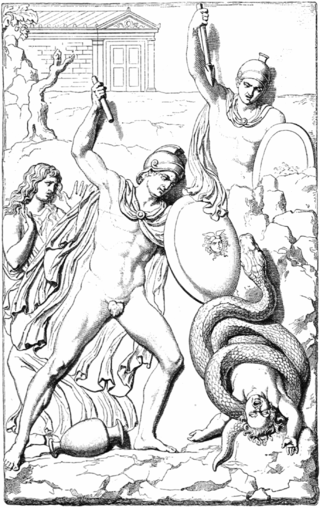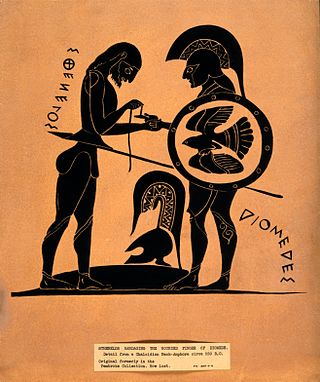In Greek mythology, Adrastus or Adrestus, , was a king of Argos, and leader of the Seven against Thebes. He was the son of the Argive king Talaus, but was forced out of Argos by his dynastic rival Amphiaraus. He fled to Sicyon, where he became king. Later he reconciled with Amphiaraus and returned to Argos as its king.
In Greek mythology, Epaphus, also called Apis or Munantius, was a son of the Greek God Zeus and king of Egypt.

In Greek mythology, Capaneus was a son of Hipponous and either Astynome or Laodice, and husband of Evadne, with whom he fathered Sthenelus. Some call his wife Ianeira.
In Greek mythology, Parthenopaeus or Parthenopaios was one of the Seven against Thebes, a native of Arcadia, described as young and outstandingly good-looking, but at the same time arrogant, ruthless and over-confident, although an unproblematic ally for the Argives.

In Greek mythology, Argia or Argea was a daughter of King Adrastus of Argos, and of Amphithea, daughter of Pronax. She was married to Polynices, the exiled king of Thebes, and bore him three sons: Thersander, Adrastus, and Timeas.
In Greek mythology, there were several people named Melanippus :
In Greek mythology, the Epigoni or Epigonoi are the sons of the Argive heroes, the Seven against Thebes, who had fought and been killed in the first Theban war, the subject of the Thebaid, in which Polynices and his allies attacked Thebes because Polynices' brother, Eteocles, refused to give up the throne as promised. The second Theban war, also called the war of the Epigoni, occurred ten years later, when the Epigoni, wishing to avenge the death of their fathers, attacked Thebes.
Actor is a very common name in Greek mythology. Here is a selection of characters that share this name :

The Seven against Thebes were seven champions in Greek mythology who made war on Thebes. They were chosen by Adrastus, the king of Argos, to be the captains of an Argive army whose purpose was to restore Oedipus' son Polynices to the Theban throne. Adrastus, although always the leader of the expedition against Thebes, was not always counted as one of the Seven champions. Usually the Seven were Polynices, Tydeus, Amphiaraus, Capaneus, Parthenopaeus, Hippomedon, and Adrastus or Eteoclus, whenever Adrastus is excluded. They tried and failed to take Thebes, and all but Adrastus died in the attempt.
In Greek mythology, Eteoclus was the son of Iphis.
Lycus is the name of multiple people in Greek mythology:
In Greek mythology, Arion or Areion, is a divinely-bred, fabulously fast, black-maned horse. He saved the life of Adrastus, king of Argos, during the war of the Seven against Thebes.

In Greek mythology, Opheltes, also called Archemorus, was a son of Lycurgus of Nemea. His mother is variously given as Eurydice, Nemea, or Amphithea. As an infant, he was killed by a serpent at Nemea. Funeral games were held in the boy's honor, and these were supposed to have been the origin of the Nemean Games.
In Greek mythology Adrastus or Adrestus, , usually refers to:
In Greek mythology, Lycurgus, also spelled Lykurgos or Lykourgos, was the son of Pheres, and the husband of Eurydice by whom he was the father of Opheltes. In the earliest account, Lycurgus was a priest of Nemean Zeus, while in later accounts he was a king of Nemea.
In Greek mythology, Menoeceus was the name of two Theban characters. They are related by genealogy, the first being the grandfather of the second.
In Greek mythology, the name Ismenus or Ismenius may refer to:
Aegialeus also Aegealeus, Aigialeus, Egialeus, was the elder son of Adrastus, a king of Argos, and either Amphithea or Demonassa.

In Greek mythology, Sthenelus was one of the Achaean Leaders. He was also counted as one of the Epigoni and a suitor of Helen.
In Greek mythology, Palaemon or Palaimon may refer to the following personages:





